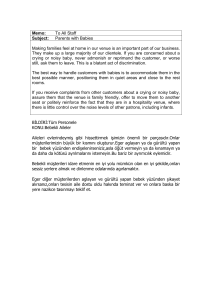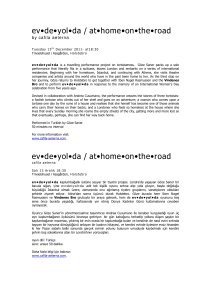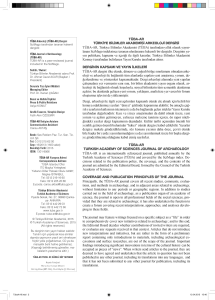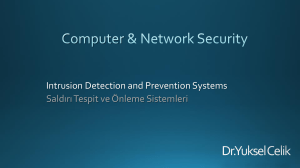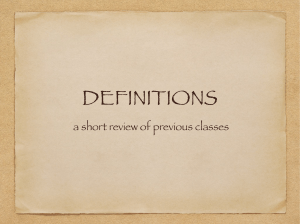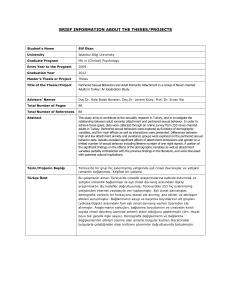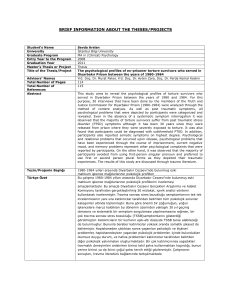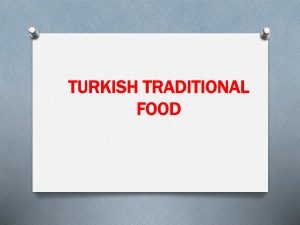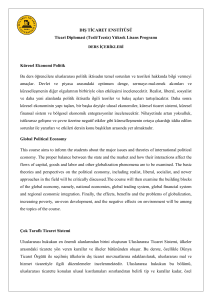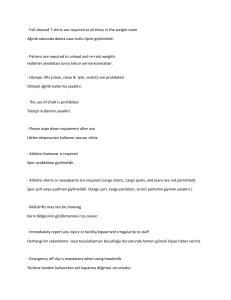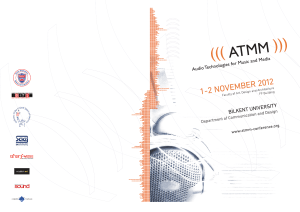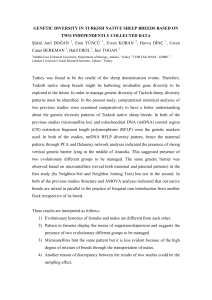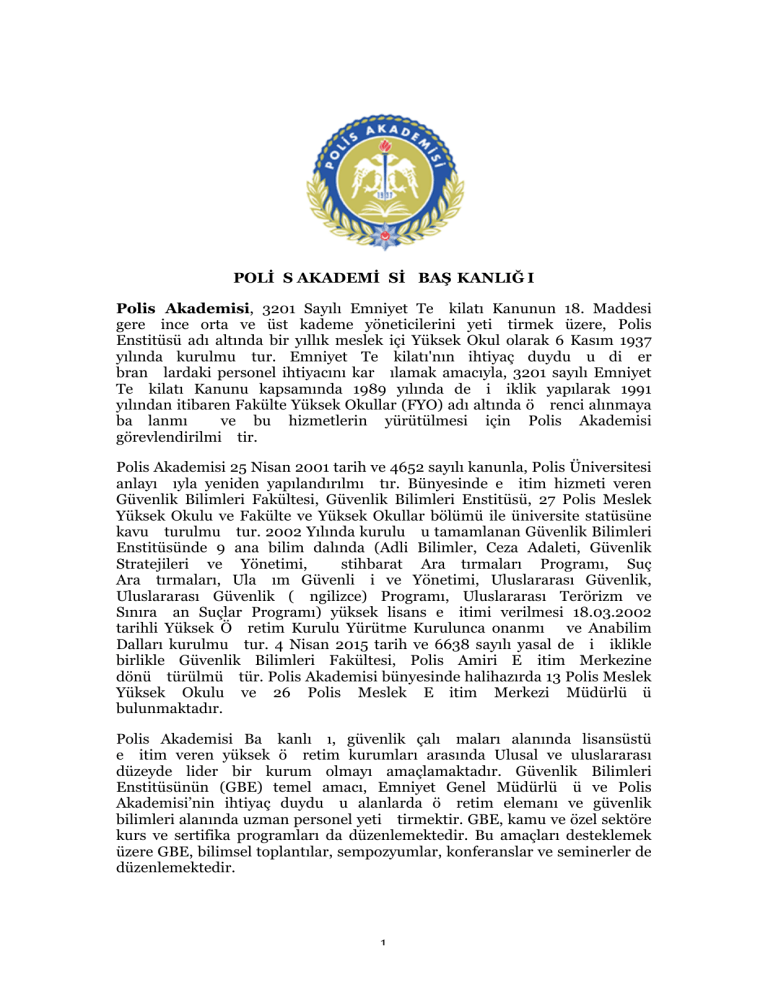
POLİ S AKADEMİ Sİ BAŞ KANLIĞ I
Polis Akademisi, 3201 Sayılı Emniyet Te kilatı Kanunun 18. Maddesi
gere ince orta ve üst kademe yöneticilerini yeti tirmek üzere, Polis
Enstitüsü adı altında bir yıllık meslek içi Yüksek Okul olarak 6 Kasım 1937
yılında kurulmu tur. Emniyet Te kilatı'nın ihtiyaç duydu u di er
bran lardaki personel ihtiyacını kar ılamak amacıyla, 3201 sayılı Emniyet
Te kilatı Kanunu kapsamında 1989 yılında de i iklik yapılarak 1991
yılından itibaren Fakülte Yüksek Okullar (FYO) adı altında ö renci alınmaya
ba lanmı
ve bu hizmetlerin yürütülmesi için Polis Akademisi
görevlendirilmi tir.
Polis Akademisi 25 Nisan 2001 tarih ve 4652 sayılı kanunla, Polis Üniversitesi
anlayı ıyla yeniden yapılandırılmı tır. Bünyesinde e itim hizmeti veren
Güvenlik Bilimleri Fakültesi, Güvenlik Bilimleri Enstitüsü, 27 Polis Meslek
Yüksek Okulu ve Fakülte ve Yüksek Okullar bölümü ile üniversite statüsüne
kavu turulmu tur. 2002 Yılında kurulu u tamamlanan Güvenlik Bilimleri
Enstitüsünde 9 ana bilim dalında (Adli Bilimler, Ceza Adaleti, Güvenlik
Stratejileri ve Yönetimi,
stihbarat Ara tırmaları Programı, Suç
Ara tırmaları, Ula ım Güvenli i ve Yönetimi, Uluslararası Güvenlik,
Uluslararası Güvenlik ( ngilizce) Programı, Uluslararası Terörizm ve
Sınıra an Suçlar Programı) yüksek lisans e itimi verilmesi 18.03.2002
tarihli Yüksek Ö retim Kurulu Yürütme Kurulunca onanmı ve Anabilim
Dalları kurulmu tur. 4 Nisan 2015 tarih ve 6638 sayılı yasal de i iklikle
birlikle Güvenlik Bilimleri Fakültesi, Polis Amiri E itim Merkezine
dönü türülmü tür. Polis Akademisi bünyesinde halihazırda 13 Polis Meslek
Yüksek Okulu ve 26 Polis Meslek E itim Merkezi Müdürlü ü
bulunmaktadır.
Polis Akademisi Ba kanlı ı, güvenlik çalı maları alanında lisansüstü
e itim veren yüksek ö retim kurumları arasında Ulusal ve uluslararası
düzeyde lider bir kurum olmayı amaçlamaktadır. Güvenlik Bilimleri
Enstitüsünün (GBE) temel amacı, Emniyet Genel Müdürlü ü ve Polis
Akademisi’nin ihtiyaç duydu u alanlarda ö retim elemanı ve güvenlik
bilimleri alanında uzman personel yeti tirmektir. GBE, kamu ve özel sektöre
kurs ve sertifika programları da düzenlemektedir. Bu amaçları desteklemek
üzere GBE, bilimsel toplantılar, sempozyumlar, konferanslar ve seminerler de
düzenlemektedir.
1 Polis Akademisi Baş kanlığ ı
Polis Akademisi Ba kanlı ı Eymir Mah. 49. Sokak PK:06834 Gölba ı, Ankara /
TÜRK YE
Telefon : +90 (312) 462 86 49-50 Faks : +90 (312) 462 85 33 www.pa.edu.tr
TURKISH NATIONAL POLICE ACADEMY
Turkish National Police Academy was founded on 6 November 1937 as Police
Institute. Not only its name, but also regulations governing it, its primary mission
and functions have undergone changes over the years. It changed in 1962 into a
school with three years curriculum; it later became a school with four years
curriculum in 1980. On December 6, 1984, Police Institute became Police Academy
with four years bachelor’s degree higher education agency according to Turkish
Constitution article 132 and Turkish Higher Education Act article 2. Police Academy
started to accept students from other universities to meet the demands of Turkish
Police Organization for different specialized branches such as engineers, medical
doctors, and lawyers in 1989. Faculty and Higher Education (FHE) Department was
founded to deal with the coordination of Turkish Police Organization’s demands and
students’ education and trainings programs.
Police Academy was reorganized on April 25, 2001, with the Act numbered 4652 as a
police university. Police Academy changed into a university status with Faculty
of Security Sciences, Institute of Security Sciences, and 27 Police Vocational School of
Higher Education. Institute of Security Sciences within Turkish National Police
Academy was founded in 2002 with nine departments, Forensic Sciences, Criminal
Justice, Security Strategies and Administration, Intelligence Studies, Crime Studies,
Transportation Security and Management, International Security, International
Security (in English), and International Terrorism and Transnational Crimes. There
are nine master’s degree and two doctoral degree programs at Institute of Security
Sciences. With the most recent legal change in 2015, Faculty of Security Sciences has
been transformed into Police Chief Training Center. There are 13 Police Vocational
School of Higher Education and 26 Police Vocational Training Centers in its
organizational structure.
As an institution of higher education the Police Academy’s goal is to provide the
Turkish National Police’s human resource demands, to run education and training
programs, to carry out scientific research, to make publications and to consult
agencies for security issues.
Turkish National Police Academy
Polis Akademisi Ba kanlı ı Eymir Mah. 49. Sokak PK:06834 Gölba ı, Ankara, TURKEY
Telefon : +90 (312) 462 86 49 Faks : +90 (312) 462 86 79 www.pa.edu.tr
2 ULUSLARARASI TERÖRİ ZM ve GÜVENLİ K
ARAŞ TIRMALARI MERKEZİ
(UTGAM)
Uluslararası Terörizm ve Güvenlik Ara tırmaları Merkezi, 10 Ekim 2006'da
Polis Akademisi Ara tırma Merkezleri Ba kanlı ı bünyesinde kurularak
faaliyetlerine ba lamı olup u an itibariyle Güvenlik Bilimleri Enstitüsü
bünyesinde faaliyetlerini sürdürmektedir.
Her biri alanında uzman ara tırmacılardan olu an kadrosuyla hizmet veren
UTGAM, teoriyle prati i bütünle tirerek özellikle politika yapıcılara, karar
vericilere ve uygulamacılara terörizm, sınıra an suçlar, insan ticareti,
göçmen kaçakçılı ı, uyu turucu kaçakçılı ı, organize suçlar ve siber suçlar
gibi güvenli i ilgilendiren alanlarda bilgi üretiminde bulunmaktadır.
Bu çerçevede, ulusal ve uluslararası bilgi üreten ara tırma merkezleri ve
güvenlik aktörleriyle i birli ini geli tiren UTGAM, bugüne kadar pek çok
seminer, çalı tay, konferans ve sempozyum organize etmi tir. UTGAM
ayrıca di er yayınları ve raporlarıyla da topluma ve güvenlik aktörlerinin
bilgi havuzuna katkıda bulunmaya devam etmektedir.
UTGAM, ulusal ve uluslararası güvenlik açısından son derece kritik olan
terörizm ve sınıra an suçlarla mücadele konusunda bilimsel ara tırmalar ve
analizler yaparak çözüm önerileri üretmeyi öncelikli hedefleri arasında
görmektedir. Merkez olarak misyonumuz, ulusal ve uluslararası alanda kamu,
özel sektör, sivil toplum kurulu ları, üniversiteler ve dü ünce kurulu ları
arasında bir ahenk tutturarak güven toplumunun in asına katkıda
bulunmaktır.
Uluslararası Terörizm ve Güvenlik Araş tırmaları Merkezi (UTGAM)
Polis Akademisi Güvenlik Bilimleri Enstitüsü
Necatibey Caddesi No: 108 Anıttepe/Ankara 06580 TÜRK YE
Tel: +90 (312) 4629087-91-92-93 - Faks: +90 (312) 4629095 www.utsam.org
3 INTERNATIONAL CENTER FOR
TERRORISM AND SECURITY
(UTGAM)
The International Center for Terrorism and Security (UTGAM) was
established on October 10, 2006 under the Department of Research Centers of
the Police Academy, but currently operates as part of the Institute of Security
Sciences.
With its highly qualified and specialized team of researchers, UTGAM merges
theory with practice and generates information particularly for policy-makers,
decision-makers and practitioners in various fields of security such as
terrorism, transnational crime, human trafficking, migrant smuggling, drug
trafficking, organized crime and cybercrimes.
Within this mainframe, UTGAM has improved cooperation with national and
international research centers and security actors and organized several
seminars, workshops, conferences and symposia. UTGAM’s other publications
and reports continue to contribute to the academia, decision makers and
security actors.
One of the main priorities of UTGAM is to conduct scientific studies and
analyses and ultimately generate recommendations for solution in the fight
against terrorism and transnational crime, a critical challenge facing national
and international security. Our mission is to institute synergy across public,
private and civil society organizations, universities and think-tanks at national
and international level and thus contribute to building the society of
confidence.
International Center for Terrorism and Security (UTGAM)
Polis Akademisi Güvenlik Bilimleri Enstitüsü
Necatibey Caddesi No: 108 Anıttepe/Ankara 06580 TURKEY
Tel: +90 (312) 4629087-91-92-93 - Faks: +90 (312) 4629095 www.utsam.org
4 Symposium Program
7th International Symposium on
Terrorism and Transnational Crime
(UTSAS 2015)
“Global In/Security and Regional Geopolitics”
December 4-6, 2015
9:00 A.M.–5:30 P.M.
Aska Lara Resort & Spa, Antalya
Kemera zı Mevkii
07100 Kundu, Antalya, Turkey
When discussing the conference on Twitter, please use the
hashtag #UTSAS2015
5 DECEMBER 4, FRIDAY
Registration
8:30 A.M.–9:00 A.M.
Welcome
9:00 A.M.–9:45 A.M
Necati ANAZ
Director, UTGAM
Osman KÖSE
Vice Rector, Turkish National Police Academy
M. Celalettin Lekesiz (TBC)
Governor & General Director of Turkish National Police
H.E. Efkan Ala (TBC)
Turkish Minister of Interior
Keynote Speaker
Colin FLINT
Utah State University
* * *
PHOTO
&
Coffee Break
9:45 A.M.–10:00 A.M.
* * *
6 Panel One
Charting ‘Security’ Today
10:00 A.M.–11:40 A.M.
Imtiaz AHMED
Dhaka University
Regional Center for Strategic Studies
Birol AKGÜN
Yıldırım Beyazıt University
Chair, Institute of Strategic Thinking
(SDE)
Fabrizio EVA
University Ca’ Foscari Venice
Mehmet Akif KİREÇÇİ
Bilkent University
Chair, Ankara Center for Political and Economic Research
(ASEM)
Moderator:
Osman KÖSE
Vice Rector, Turkish National Police Academy
Q&A
*
*
*
Lunch Break
11:40 A.M.–14:00 P.M.
*
*
7 *
Panel Two
Global Geopolitics - Regional Focus
14:00 P.M.–15:45 P.M.
Dalia GHANEM
Carnegie Middle East Center
Mehmet ÖZKAN
Regional Director of Latin America, Turkish International Cooperation and
Coordination (TİKA)
Mohammad Salih MUSTAFA
University of Exeter
Hakkı UYGUR
Al-Sharq Forum, TRT World
Moderator:
Cemalettin Kani TORUN
Member of Turkish Parliament
Q&A
* * *
Coffee Break
15:45 P.M.–16:00 P.M.
*
*
8 *
Panel Three
Middle East in Flux
16:00 P.M.–17:45 P.M.
Didier CHAUDET
Islamabad Policy Research Institute
Sciences Po Paris
Vugar İMANBEYLİ
İstanbul Şehir University
Ezzeddine ABDELMOULA
AlJazeera Center for Studies
Hasan KÖSEBALABAN
Five College Research Associate
Five Colleges
Moderator:
Mehmet ŞAHİN
Gazi University
Institute of Strategic Thinking
(SDE)
Q&A
*
*
*
Cocktail
8:00 P.M
9 DECEMBER 5, SATURDAY
Panel Four
DAESH and Foreign Fighters
09:00 A.M.–10:40 A.M.
Ceren YAZGAN
Deputy Director General for Security and Intelligence Affairs
Turkish Ministry of Foreign Affairs
Skënder PERTESHI
Kosovar Center for Security Studies
(KCSS)
Nathan PATIN
Bellingcat
Murat ASLAN
Yıldırım Beyazıt University
Moderator:
Cemalettin HAŞİMİ
General Director of Press and Information
Chief Advisor to the Prime Ministry
The Director of the Public Diplomacy
Q&A
*
*
*
Coffee Break
10:40 A.M.–11:00 A.M.
*
*
10 *
Panel Five
Peace Process: In Tatters or in Layover?
11:00 A.M.–12:30 P.M.
Şaban KARDAŞ
Chair Center for Middle Eastern Strategic Studies (ORSAM)
Luis De La CALLE
Director, Centro de Investigación y Docencia Económicas
(CIDE)
Murat ÇEMREK
Necmettin Erbakan University
Mehmet Emin EKMEN
Lawyer and Former Member of Turkish Parliament
Moderator:
İhsan AKTAŞ
Chair, GENAR
Q&A
* * *
Lunch Break
12:30 P.M.–14:00 P.M.
*
*
11 *
Panel Six
Islamophobia and (De)Radicalization
14.00 P.M.–15:40 P.M.
Yunus KAYA
İstanbul University
Hilal BARIN
Foundation for Political, Economic and Social Research
(SETA)
Muhammad SAIFUL
S.Rajaratnam School of international Studies
(RSIS)
Mehmet KÖSE
Vice President, Presidency for Turks Abroad and Related Communities
Moderator:
Ahmet UYSAL
Marmara University
Institute of Strategic Thinking
(SDE)
Q&A
* * *
Coffee Break
15:40 P.M.–16:00 P.M.
*
*
12 *
Panel Seven
Media and Terror
16:00 P.M.–17:30 P.M.
Darren PURCELL
University of Oklahoma
Yusuf ÖZHAN
Editor, External News Service
STAR Newspaper
Turan KIŞLAKÇI
TRT Arabic
Mücahit KÜÇÜKYILMAZ
Presidency of the Republic of Turkey
Moderator:
Necati ANAZ
Director, UTGAM
Q&A
*
*
*
Gala Dinner
19:30 P.M.
13 DECEMBER 6, SUNDAY
Panel Eight
Security and Geopolitics: An Appraisal
09:00 A.M.–10:45 A.M.
Colin FLINT
Utah State University
Mesut ÖZCAN
Director, Diplomacy Academy
Rep.of. Turkey Ministry of Affairs
Ahmet UYSAL
Marmara University
Institute of Strategic Thinking
(SDE)
Christopher COKER
The London School of Economics and Political Science
(LSE)
Moderator:
Muhsin KAR
Yıldırım Beyazıt University
Q&A
*
*
*
Closing
11:00 A.M.
*
*
14 *
ABSTRACTS
DECEMBER 4, FRIDAY
Colin Flint
Can we help you? Academic geopolitics and the problems of policy
relevance
Geopolitics has become popular again. It became a topic of academic study in
the late nineteenth century as tensions between the great powers, and
imperialist agendas, were on the rise. After the Second World War academics
ignored the topic of geopolitics, but it is now a field of great interest in
geography, international relations, and other disciplines. In addition,
commentators and politicians across the world are increasingly using the term
“geopolitics.” Perhaps this is a cause for concern as the classical geopolitics of
the nineteenth century was the precursor of the two world wars. And yet, the
many issues facing the world today (such as terrorism, civil war, refugee
crises, and nationalism) would benefit from a geopolitical analysis. The
problem is that scholars of geopolitics are wary of making mistakes of the past
and shy away from analysis with clear policy prescriptions. This decision
leaves the door open for politicized interpretations of the world that are
closely tied to particular national and ideological agendas. So, what room is
there for an academic geopolitics that is objective but also practical? This
question is explored by describing the geopolitical tenets of world-systems
analysis and exploring its ability to understand ongoing political crises and
related pressing policy demands.
Imtiaz Ahmed
Terrorism beyond Reason: Possibilities and Limits
Few would dispute the fact that there are different forms of terrorism. Earlier
I had identified more than 25 forms of terrorism and clustered them into four
groups on the basis of ‘reason’ and the manner in which terror had been
rationalized for reproducing the power of the state and non-state or subalterns
(i.e. the marginalized). While terrorism identified with the reason of the state
and the subaltern or even the one that is identified with both is not difficult to
understand, there is still a dearth of knowledge in understanding the use of
terror beyond reason or the one that I choose to call, post-rational terrorism,
resulting mainly from suicide bombing. I will limit my focus on Bangladesh
for it too had a share of such terrorism, particularly following the arrival of
religio-centred terrorism and suicide bombing. The objective of the paper,
however, would be to explore the epistemological and doctrinal foundations of
such terrorism.
15 Fabrizio Eva
Always late. The inability/incompetence of the so-called
international community to solve the geopolitical dynamics.
The “stability” of the pretended international state system is the mantra of the
global “Order”. A “state” system in which actually was not so important the
institutionalization of the states (recognized, failed, quasi-, de facto, nonstate) if they were effective pieces of the “stability” puzzle. Onlyfive-to-ten
small group of decision makers are the countries called “international
community” claimed by the mass media and by the political leaders. Among
them the logic of poker (when and how doing a bluff) and the assertion of
power seem to be the main concern and geostrategic-political tools.
Considering the increasing number of no-state actors and dynamics and/or
actions (purposely in the Mediterranean Sea and The Middle East) the selfevident spread between official political statements and chosen means, and
the concrete dynamics in action, for dealing successfully with them it is
necessary to change the dominant approach and Iconographies (a la
Gottmann).
For preventing(or solving) a critical geopolitical dynamics which is going to
drift to (or is already) a violent conflict it would be necessary to act quickly
considering the real factors of solution which are not the iconographic concept
of “sovereignty” and “territorial integrity”(widely used in the official
statements), as usually declared by political leaders and spread by the mass
media, but 1) the shape of the territory and the climatic conditions, 2) the
iconographic premises (history, pretended heritage, mith, etc.) of the human
grouping in the local territory, 3) the language and the “genre de vie” (lifestyle) of the existing human groups and their distribution in the territory.
Accepting the idea that human groups are able to decide along a bottom-up
path and that they are able to take “rational” and not only emotional decisions
are the basic premises for solving crisis; and giving timealong with granting to
everybody a minimum level of economic conditions and hope in the future.
Dr. Dalia Ghanem-Yazbeck
Based on my research experience in a country that was the scene of
jihadist violence (Algeria), this paper offers a discussion on the radicalization
process and the appeal of extremist groups such as the so-called Islamic State
to youth (both Arabs and Westerners). In looking at this conflict, one can see
that there are certain similarities between the reasons for which thousands of
youth are joining the Islamic State and the Algerian experience of the 1990s.
In short, I will be discussing the drivers that entice youth into jihadism based
on my interviews with former Algerian jihadists. Then, the paper will shed
light on the threat of the Islamic State (IS) organization in North Africa with a
focus on Algeria, which is the last bulwark against terrorist and violent
extremist groups that are spreading in Tunisia, Libya and Mali. Is the IS
organization a real threat for North Africa or a publicity stunt? What are the
security challenges that the region is facing ?
16 Hakkı UYGUR
As one of the most important actors in the Middle Eastern political geography,
Iran is a country which has achieved to attract constantly the attention of the
international community, especially since the Islamic Revolution of 1979. The
Islamic Revolution, Iran-Iraq War, its influence in post-Saddam Iraq, and
recently the nuclear tension with the West and its direct interference in the
Syrian crisis demonstrate the country’s dominant role in the region. The Arab
Spring led to instabilities in the 30 year-old foreign policy of Iran as in other
countries. Although it has established close relationship with the Islamist
opposition in the region either through its discourse or through its practices
for the last 30 years, Iran found itself supporting the only secular Arab
nationalist dictatorship in the region due to the Syrian crisis, and the
Hezbollah, well-known for its fight of decades against Israel, has come to a
point to risk the lives of thousands of its militants for the sake of protecting
the leader of the Baath Party who once said “if we leave, the region will
completely fall under the control of Islamists.” Particularly, the nuclear
agreement which was signed with 5+1 countries led by the USA in September
has some properties that may be a milestone for the national and foreign
policy of Iran. According to most observers, the essential reason why Iran
reached an agreement with the West at the cost of restricting largely its
activities is its economic situation. The embargos together with the
approximately fifty per cent of decline in oil prices negatively influenced the
economy of Iran, which is obviously observed in the country. The circles
desired to be excluded from the scene of politics for the last 10 years currently
want to make use of the social optimism and expectations created by the
nuclear agreement and this down-wind, they desire signing under a great
turnabout in Parliamentary elections to be held in February 2016. It is still
ambiguous for now how those who has had the luxury of ruling without rivals
for the last 35 years will manage the new period. In this paper, we will briefly
handle the historical background of the problems in which Iran is involved
today as an effort to make a better explanation of its current policies, and then
we will try to explain its position, intentions and targets in current issues.
Didier Chaudet
The fight against transnational jihadism: the Iranian perspective
The latest terrorist attacks in Paris have shown us that transnational jihadism,
inspired by ideological groups like Al Qaeda and Daesh, is an international
issue. But the first victims of such groups are people from the Muslim world in
general and from the Middle East and South Asia in particular. For Iran, a
country at the crossroads between what we schematically call the Middle East,
and the Indian subcontinent, the threat is of particular importance. Iran faces
an international jihadist issue in the Sistan-Balochistan area. Some of its most
important neighbors (Iraq, Pakistan, Afghanistan) are plagued by radical
Islamist rebellions, with a strong anti-Shia element. And Tehran has involved
itself in Syria as well as in Iraq not only for very real geopolitical reasons, but
also because it sees Daesh (IS) as a threat for its national interests. The goal of
this analysis will be to show how Iran is dealing with the jihadist threat as a
17 whole and to assess the political and military choices made so far by Tehran in
that regard.
Vugar İmanbeyli
Putin’s Gambit in Syria: A Look inside the Russian Politics
On 30 September 2015, when the Russian president Vladimir Putin decided to
deploy his military in Syria, his gambit radically changed balance of power in
the ground. Assad forces supported by Russian bomber aircraft have gained
self-confidence and tried to recapture positions from the opposition groups.
Here it should be asked why Syria turned to be the most important security
issue for Russia. Many analysts have emphasized global and regional interests
of Russia. Russian officials promote “a war against terror” discourse. But this
paper argues that internal dynamics played a decisive role in sending military
units to Syria. In this context, the paper analyzes Russian internal politics,
nature and composition of Putin’s regime, internal difficulties emerged after
the Ukrainian crisis, and the recent challenges posed to the Putin
administration. It argues that the Syrian gambit facilitates consolidation of the
ruling elite and provides more legitimacy to the current regime.
Hasan Kösebalaban
The Syrian Conundrum: New Security Challenges and Policy
Options for Turkey
This paper explores the challenges facing Turkish foreign policy in the context
of recent evolution of the Syrian crisis to a stage characterized by direct
interventions of global powers. The evolution of ISIS to a sophisticated terror
organization with a global reach and capacity has altered the political
calculations of Western powers vis-à-vis the Syrian crisis, presenting serious
security challenges for Turkey. Especially significant for Turkey is
transformation of perceptions regarding Iran and the Assad regime from
problem-makers to stabilizers. Furthermore, the ISIS terror threat has led in
major world capitals to regard the PKK-linked PYD as a formidable anti-ISIS
counter-force worthy of receiving military assistance. The paper discusses
alternative policy options for Turkey to counter the new security environment.
Ezzeddine Abdelmoula
Post-Arab spring geopolitics
and
the
new
Middle
East
For the last five years, the Middle East and the Arab world in particular have
undergone a significant geopolitical transformation. The changes that took
place in many parts of the region following the Arab spring revolutions are
unprecedented in our modern history. The Arab spring brought with it hopes
for democracy, stability and social justice, but all these promises seem to have
gradually faded away. The Counter-revolution, both at the domestic and
regional levels, has so far succeeded in restoring and consolidating
authoritarian rule in certain countries, but the cost has been extremely high.
Violent conflicts of all sorts, widening insecurity and continuous attempts of
fragmentation are among the apparent dangers threatening stability and the
unity of an increasing number of countries. These new dynamics may bring
the long established regional order to an end and redraw the map of the post 18 WW1 Middle East. This changing setting is redefining the geopolitics of the
region and repositioning regional power sand their inter-relations.
DECEMBER 5, SATURDAY
Nathan Patin
The Other Foreign Fighters: An Open-Source Investigation into
American Volunteers Fighting the Islamic State
An estimated 20,000 to 30,000 foreigners have traveled to Syria and Iraq to
fight with the Islamic State (IS) and other Sunni jihadist groups. Of those,
roughly 150 to 200 are American citizens. This report seeks to shed light on a
related, yet understudied phenomenon, namely, that of Americans traveling to
Syria and Iraq to fight *against* IS. While there have been a number of
vignettes in the media highlighting particular Americans or groups of
Americans who have traveled abroad to combat IS, this is the first systematic
study, relying solely on open-source information, to provide a concrete
understanding of not only the scale of anti-IS American foreign fighters, but
also their backgrounds and motivations.
Luis de la Calle
Nationalist peace processes in Europe: A three-actor solution
Terrorist groups are those unable to seize territory and militarily defeat their
rivals. For this reason, their best prize is to bring the state into the negotiation
table and extract some concessions. In the case of groups with separatist
goals, the bargaining range is quite large, concessions going from full
independence (such as Israel, Cyprus, and Kosovo) to some level of autonomy
(such as Corsica), in exchange for giving up their weapons and returning to
legality. Their best strategy to reach that goal is to infringe such a high level of
violence on their rival that the latter prefers bargaining that enduring the
costs associated to violence.
Negotiating, however, is not only a matter of two --terrorists and the
government. To reach an agreement, terrorists rely on a political front, which
can show support for terrorists’ goals in the streets, the polls, and the booths,
giving them legitimacy. And by the same token, governments also rely on
voters and public opinion. Weak terrorists are rarely taken seriously, and
fragile governments have no popular mandate to negotiate. Thus, every
negotiation involves a three-actor bargaining process with lawmakers and
terrorists sitting next to each other at the same table, and the populace waiting
behind the door to sanction or strike down the potential agreement.
This makes every negotiation even more complex, since governments and
terrorist leaders not only must internally balance hawks and doves to avoid
splinters and defections, but also they have to consider the potential public
support (within each constituency and outside) for every solution.
19 Thus, it is no surprise that few terrorist conflicts are solved through political
negotiations. The experiences of Northern Ireland, Basque Country and
Corsica indicate that peace processes only succeed when governments and
terrorists’ political fronts can reap the peace dividend –usually through
electoral victories at the expense of more moderate nationalist groups. Hawks
threatening with derailing peace processes if no political gains are fixed by the
agreement may be satisfied with bright electoral prospects that would grant
local power to the hitherto political outcasts. And governments reluctant to
talk to terrorists could give it a second thought if the polls anticipate an
electoral dividend for the one bringing violence to an end. As these two
realizations rarely go in line, peace processes tend to fail, as illustrated by ETA
and the FLNC.
Murat Çemrek
What to do with the Peace Process? N/either Keep in the Fridge
N/or Put it into the Microwave
Although the Kurdish problem is as old as or even older than the Turkish
Republic, for many years either it has been neglected or identified with the
PKK terrorism at least in the last thirty years. With the end of the Soviets what
has been earlier swept under the carpet -such as identities- in the name of
security has come fore to be named as ghosts this time. Even today it is not
easy to notice and comprehend identities from based on the ethnicity, religion
and sects to gender beside the official national identity. Thus, peace process,
besides being a conflictual buzzword, has been a hot topic of the Turkish
politics for sometime. It has been named as national unity and fraternity
project not to attract Turkish nationalist anger. On the eve of the June 7
general elections the tensions between the main actors of peace process have
strained in the public discourses, which has been commented as the heavy
load of the elections on the sides. Since the June 7 general elections resulted
in the November 1 snap elections and the concomitant government everyone
asks each other about the fate of the peace process. Then it is the best time to
evaluate possible scenarios based on the statement of President Erdogan’s
about the peace process to be in the fridge as keeping it there or putting it into
the microwave.
Darren Purcell
The role of popular culture, particularly humor, is of increasing
importance in critical geopolitics.
This article examines how humor is used to frame the Arab Spring for
American audiences. Sifting through the jokes for references to places, events
and significant actors, the data was mapped to show what places and events
were mentioned in the monologues. The jokes were interpreted through
critical discourse analysis to identify the themes invoked by the comedians.
Results. The Arab Spring countries most mentioned were Libya, Egypt and
Syria. The majority of the jokes about these countries work through
combinations of incongruity theory and the exploitation of extant caricatures
of leaders. Additionally, the jokes reflected concerns over US actions in the
region and simultaneously, US leadership’s seeming inability to craft a
coherent plan to address the events. Conclusions. We establish the link to
20 humor and geopolitical imagination noting that the themes of
American policy, American leadership, regional corruption and caricatures of
leaders comprised many of the jokes, crafting a particular worldview of the
region as intractable.
Muhammad Saiful Alam Shah Bin Sudiman
Alternative Approaches to Terrorist Rehabilitation
Countering terrorism requires three types of responses. First, it requires
kinetic response to disrupt the operation and end terrorist kinetic capabilities.
Second, is to disrupt terrorist group’s financial support through effective and
robust countering terrorist financing monitoring mechanism that is supported
by domestic and international law. The third response aims to win the hearts
and minds of terrorist and former terrorist through several modes of
rehabilitation. Religious engagement is one of terrorist rehabilitation mode. It
is a response to religious dimension centred by terrorist Islamist groups. This
paper discusses two approaches employed in religious rehabilitation. The first
approach is termed as the Teacher-Student Approach. Concepts such as
“functioning knowledge,” the “deep approach to learning” and “constructive
alignment” are used to describe methodologies that are being used in this
mode of rehabilitation to cultivate a higher level of learning within the
cognitive domain. The second approach is known as the Da’i-Mad’uw
relationship. Da’i refers to the Muslim individual that takes upon him to
propagate Islam to others. Mad’uw is the individual who is benefitting from
this, regardless of his faith affiliation.
M. Mücahit Küçükyılmaz
Medyanın terörü, terörün medyası
Modern dönemde medya ile terör arasındaki ili ki hem gazetecilik eti inin,
hem de mesleki prati in tartı ma alanlarından biri olmu tur. Terörün
yıldırma, deh et salma i levini görmesi için ileti im araçlarına ihtiyaç
duyması; ileti im araçlarının da yayma, da ıtma i levi nedeniyle bu iki
kavram arasında riskli bir ba
olu maktadır. Kitle ileti im araçları ve
propaganda teknikleri sayesinde kamuoyunda etki alanı olu turan terör
örgütleri, bugün kendi yayın organlarına ilaveten kaotik sosyal medya
ortamında, ço u kez “kullanı lı aptallar” üzerinden nüfuz ve güç
kazanmaktadır. Mesela I
D terör örgütünün yayın organı Dabık, Tayyip
Erdo an ile Barack Obama’yı hedef göstererek kapa a ta ıdı ında, BBC
Türkçe sitesi bunu “I
D'in dergisinden Erdo an ve Obamalı kapak” diye
vermekte; haberi alıntılayan Türkiye’deki bazı siteler ise “I
D dergisi
Erdo an'ı kapak yaptı” ba lı ıyla hem terör örgütünün manipülasyonuna
alet olmakta, hem de kendilerince Erdo an ile I
D arasında irtibat
bulundu u algısı olu turmaya çalı maktadır.
Oysa terör haberlerinin özenli verilmesini savunan, ancak Türkçe servisinde
son dönemde militan gazetecili in ince örneklerini veren BBC’nin terörle
ilgili yayın ilkelerifarklı bir durumu i aret etmektedir.2005’te Londra’da
gerçekle tirilen terör saldırısının ardından, BBC tarafından hazırlanan
“Yayın lkeleri: Sava , Terör ve Acil Durumlar” ba lıklı metin, gazetecinin
sava , terör olayları ve do al afetler gibi durumlarda nasıl davranması
21 gerekti ini ortaya koymu
ve bu ilkeler
ngiliz medyası tarafından
benimsenmi tir.
Söz konusu metne göre:
1. Haberci, olayla ilgili tüm edindi i tüm bilgileri güvenlik güçleriyle
payla mak zorundadır.
2. Bir terör saldırısı söz konusu oldu unda muhabir haberi hazırlarken;
editörlerine ve yöneticilerine danı mak, onlardan onay almak
zorundadır.
3. Haberin “tonu”, en az güvenilirli i kadar önemlidir. Kamuoyunda
olu an duygu yo unlu u, korku ve panik havası nedeniyle
habercinin, konuyu ele alırken “hassas” davranması gerekir.
Ayrıca
ngiliz medya yöneticileri, muhabirlerini “izleyicinin duygularıyla
oynamamaları ve olayları sansasyonel biçimde aktarmamaları” konusunda
uyarmı tır. Aynı
ekilde
ngiliz yayıncılar, herhangi bir biçimde suça
te vik eden ya da cesaretlendiren unsurlara yayınlarında yer vermeme
konusunda ortak karar almı lardır.
Ancak Türkiye’deki terör saldırıları söz konusu oldu unda, BBC ve benzeri
uluslararası yayın kurulu ları ile ulusal medyanın önemli bir kısmı terörü
övücü, iddetin boyutunu abartan, toplumda ve dı dünyada yılgınlık ve
deh et olu turacak ekilde, hatta failin bizzat devlet oldu unu bildiren
bir terör habercili i sergilemektedirler. Buna göre, söz konusu ilkelerin BBC
açısından sadece Britanya sınırları içerisinde ve ngiltere’nin çıkarları söz
konusu oldu unda geçerli oldu unu dü ündürtecek bir çifte standart
ortaya çıkmaktadır. Bu durumda, medya terör ili kisini, gazetecilik eti iulusal çıkar çatı ması parantezinden çıkararak; kamu yararı ve güvenli i
meselesi olarak ele almakta fayda bulunmaktadır.
Hilal Barın
Bir Kültürel Irkçılık Formu ve Nefret Suçu Olarak İslamofobi
slamofobi, 11 Eylül 2001 tarihinde Amerika’da gerçekle en
saldırılardan sonra, Batı’da sıklıkla kullanılan kavramlardan biri olmakla
birlikte sadece yakın zamana özgü bir kavram de ildir. slamofobi hem
slam’dan korkma ve ürkme hem de Müslümanlardan çekinme ve
onlardan ho lanmama eklinde tezahür eden irrasyonel bir korkudan,
fobiden kaynaklanan çe itli söylem, tutum ve tavırlar bütününden
olu an bir olguya dönü mü tür. 11 Eylül’de gerçekle en saldırılardan
sonra, gerek Avrupa’da gerekse de Amerika ve Avustralya’da ya ayan
Müslüman ki iler, inançlarından dolayı ekonomik, sosyal ve siyasal
düzeyde
ayrımcılı a
maruz
kalmaya ba lamı lardır.
Batı toplumlarında
slamofobi söylemlerinin yükselmesiyle,
slâm’ın
Batı kültürüyle ortak de erleri olmayan, batılı de erlerle çatı an ve bu
de erleri ortadan kaldırmayı gaye edinmi bir din, hatta dinden de öte
siyasal bir ideoloji oldu u yönündeki argümanlar yaygınlık kazanmaya
ba lamı tır.
slamofobinin yaygınla masıyla, Batılı toplumlarda
antisemitizmin yerini, anti- slamizmin almı tır.
slamofobi ile
olu turulan korku ve nefret ile birlikte, Müslümanlara kar ı yapılan
ayrımcılık ve ırkçılık me rula tırılmaya çalı ılmı
ve Batılı
toplumlarda ya ayan Müslümanlar, “Yeni Ku ak Siyahlar” konumuna
gelmi lerdir. Irkçılık, yabancı dü manlı ı, önyargı, ayrımcılık,
22 dı lanma, terör gibi kavramlarla tanımlandı ı görülen slamofobi’nin
ortaya çıkmasında ve yaygınlık kazanmasında sosyal, kültürel, tarihî, dinî
vb. çok çe itli sebepler etkili olmu tur. Yeni bir ırkçılık türü olarak
slamofobi, din ve medeniyet alanlarında, temel hak ve hürriyetleri ihlal
eden, müeyyidesi olmayan bir ayrımcılık türüdür. 19’uncu yüzyılın sonu
ve 20’inci yüzyılın ba ında ortaya çıkan ve ırk ve renk üstünlü üne
dayanan ırkçılıktan sonra 1950’li ve 60’lı yıllarda yaygınla an kültürel
ırkçılık da bugün büyük oranda bir nefret suçu olarak tanımlanmakta ve
cezalandırılmamaktadır. Irk, renk ve kültür ırkçılı ı ve anti-Semitizm
konusunda gösterilen hassasiyet, i
slam’a ve Müslümanlara
saldırmaya, hakaret etmeye geldi inde ikircikli bir tutum
sergilenmektedir. Müslümanlara sırf dinlerinden, inançlarından ve
kültürlerinden dolayı nefret duyulması, bu insanların a a ılanması,
ayrımcılı a tabi tutulması, sözlü ve fiili
iddete maruz bırakılması,
ırkçılık ve ayrımcılıktır ve bu saikle yapılan her eylem, bir nefret suçudur
ve insan hakkı ihlalidir. Anti-Semitizm ve di er ırkçılık türleri gibi,
slamofobi’nin de bir kültürel ırkçılık formu ve nefret suçu olarak
tanımlanması ve cezai müeyyidelere ba lanması istenmektedir.
Tebli imizde bu ba lamda slam ve Batı medeniyetleri kıskacında bir
kavram olarak incelenecek
slamofobinin Müslümanları ne derece
etkiledi i ve slamofobinin yeni bir kültürel ırkçılık formu ve nefret
söylemi/suçu olup olamayaca ı tartı ması ortaya konacaktır.
23

